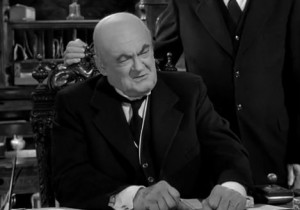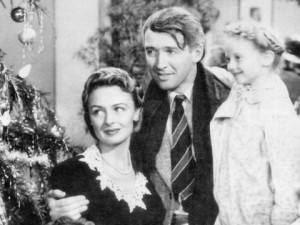Stewart’s career, in fact, continued unabated—if anything, rejuvenated, revealing new facets of the actor’s style and range. He made four Hitchcock films, two of them masterpieces, and more than fifteen Westerns from directors that included Anthony Mann, Andrew V. McLaglen and John Ford.
Unknown at the time, Wonderful Life would be Frank Capra’s last outstanding movie—and his darkest. Nor was it generally revealed until years later that the film’s austere moments and its negative aspects, drastic departures from the trademark Capra optimism, reflect the director’s own insecurities and self-doubts. He suspected he might have lost the magic of his pre-war films—It Happened One Night, Mr. Deeds Goes to Town, You Can’t Take It with You, Mr. Smith Goes to Washington—much as a vindicated Stewart had had doubts.
 The most prolific New York Times critic at the time, Bosley Crowther, wrote one of the less favorable initial reviews. Toward the end of his column of December 23, 1946, he wrote, “Lionel Barrymore’s banker is almost a caricature of Scrooge, and Henry Travers’ ‘heavenly messenger’ is a little too sticky for our taste.” The Barrymore reference is correct: riding in a black coach and dressing in black rather unnecessarily underline the evil banker of the scenario. Barrymore’s somewhat one-note performance revisits a similar cantankerous role, that of old Dr. Gillespie in the Dr. Kildare movies which ran 1937-1947.
The most prolific New York Times critic at the time, Bosley Crowther, wrote one of the less favorable initial reviews. Toward the end of his column of December 23, 1946, he wrote, “Lionel Barrymore’s banker is almost a caricature of Scrooge, and Henry Travers’ ‘heavenly messenger’ is a little too sticky for our taste.” The Barrymore reference is correct: riding in a black coach and dressing in black rather unnecessarily underline the evil banker of the scenario. Barrymore’s somewhat one-note performance revisits a similar cantankerous role, that of old Dr. Gillespie in the Dr. Kildare movies which ran 1937-1947.
Regardless of Crowther’s feelings of “stickiness,” I believe Travers’ performance is the most enjoyable in the film, second only to Stewart’s. His screen fame as a kindly old man—he started in Hollywood at age 58—had been well established by this time with High Sierra, The Bells of St. Mary’s and, in particularly, Mrs. Miniver where his character Mr. Ballard gave the title lady a run for her money in an annual rose contest and where the actor won his only Oscar nomination.
The possible sentimentality of Travers’ acting, especially after the horrors of WWII, probably was relevant then; now it seems almost endearingly quaint, perhaps, with the world’s current difficulties, even refreshing. Travers is but one of many familiar 1940s supporting actors who fill the movie: Thomas Mitchell, Beulah Bondi, Frank Faylen, Ward Bond, Gloria Grahame and H. B. Warner. The less well known include Frank Albertson (Sam Wainwright), Samuel S. Hinds (George’s father), Sheldon Leonard (Nick the bartender), Charles Lane (real estate advisor), Charles Halton (bank examiner), Ellen Corby (bank customer) and Tom Fadden (bridge tender).
These days, the silliest part of the film must be the “outer space” conversations among the heavenly beings, with blinking stars synchronized with their voices. An alternative would require a much longer exposition, so this method is preferred, but in a film today the neon lights and cartoon constellations wouldn’t wash. In the beginning of the movie, Angel First Class Oddbody is being sent to earth to save a despairing soul, this guy George Bailey. A flashback for the benefit of Clarence—and the viewer—introduces the children who will become adults later, reveals George’s boyhood character and imparts an incident that will be important later in the plot.
 As for the end, of course, it finishes well. All the townspeople—literally everybody, because everybody in Bedford Falls is George Bailey’s friend—chip in to make up the $8,000 bank shortage, even the bank examiner—my, how bankers have changed! Mother Bailey, Uncle Billy, brother Harry, the Bailey maid—everybody—overcrowds the house to save George’s hide. First “Hark! the Herald Angels Sing,” then everyone intones “Auld Lang Syne.” George has his wife and kids close. Clarence triples the good cheer and warm feelings with a book inscription: “Remember, George, no man is a failure who has friends.” And when a bell dings on the Christmas tree, daughter Zuzu (Karolyn Grimes) remarks, “Every time a bell rings, an angel gets his wings.”
As for the end, of course, it finishes well. All the townspeople—literally everybody, because everybody in Bedford Falls is George Bailey’s friend—chip in to make up the $8,000 bank shortage, even the bank examiner—my, how bankers have changed! Mother Bailey, Uncle Billy, brother Harry, the Bailey maid—everybody—overcrowds the house to save George’s hide. First “Hark! the Herald Angels Sing,” then everyone intones “Auld Lang Syne.” George has his wife and kids close. Clarence triples the good cheer and warm feelings with a book inscription: “Remember, George, no man is a failure who has friends.” And when a bell dings on the Christmas tree, daughter Zuzu (Karolyn Grimes) remarks, “Every time a bell rings, an angel gets his wings.”
“Thataboy, Clarence,” George says and winks.
A little unrealistic? You be the judge. It’s a peculiar idiosyncrasy of human nature: a TV news story about a destitute family will inevitably garner an uncommon response of help from viewers, yet those same people—and many more besides—will completely ignore the plight of starving thousands in Africa or South America. So the outpouring of financial help from every citizen of Bedford Falls is somewhat suspect.
Nice if it were true.